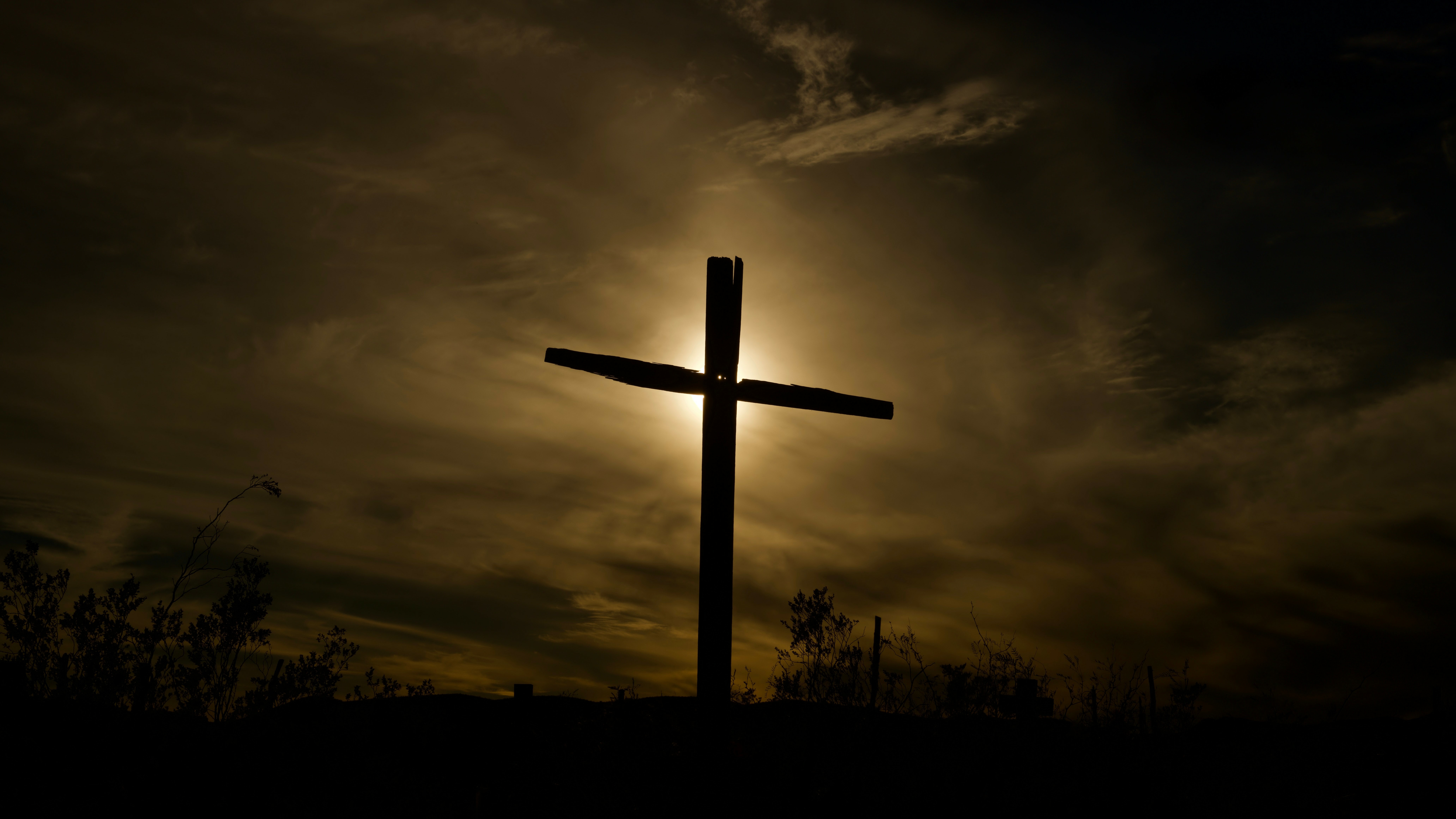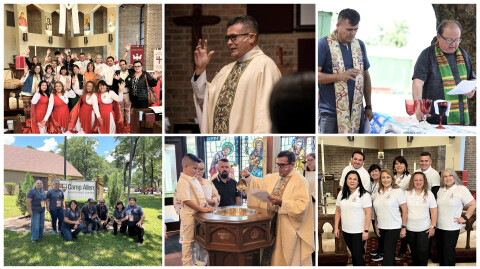TLDR: The more we downplay Good Friday, the more we underestimate Christ’s sacrifice. Without Good Friday there is no Easter Sunday. Stay in the vigil, keep watch with Mary, don’t you dare look away.
“Don’t forget that he is still alive,” said a friend of mine last week. I responded, “I know he is alive, and will be forever, but I will try my best to enter fully into the Tridium mystery this Holy Week.” The Tridium is the three days from Maundy Thursday to the evening of Easter Sunday. To enter fully into the Tridium means that we place our knowledge of the resurrection on a shelf until Easter, and celebrate Maundy Thursday and Good Friday as though there will not be an Easter Sunday. In other words, we transport ourselves in our imagination to First Century Palestine and we join Jesus of Nazareth and his group on the day of the triumphant entrance. We imagine what it would have been like to be enraptured by this prophet from Galilee, who so completely fulfills the prophesy of Zechariah 9:9. We throw our own cloaks on the ground and cut branches of palm to join the crowds in their shouts of acclamation. We follow Jesus and listen to his voice, and we let his words and actions inspire our imaginations and stir our hearts.
When we hear the crowds ask, “Who is this?” and some answer, “This is the prophet Jesus from Nazareth in Galilee,” we will keep silent and just reflect on the many similarities and dissimilarities between Jesus and the prophets of the Jewish Scriptures. We will not jump in, aided by two thousand years of theology, and say, “He is Messiah, the perfect lamb of Genesis 22, the Suffering Servant of Isaiah, the Glory of God returning to his Temple.” When Jesus cleans his temple, overturning tables, scattering the money changers about, and setting free the birds intended for sacrifice, we will reflect quietly on Psalm 69:9. We will not be scandalized by his behaviors because we know this is the house of his Father, and not a place of commerce to enrich the institution’s coffers. And we will reflect on the many ways the modern church has been more preoccupied with wealth and privilege than with the worship of God. We will join the children at the temple shouting, “Hosanna to the Son of David,” rather than the opposition who fail to understand the significance of his actions.
We will then follow Jesus to Bethany to spend the night, most likely at Martha, Mary, and Lazarus' house. In the morning, we will see him curse a fig tree because it had failed to produce fruit. Jesus will make a connection between producing fruit and having faith. We will smile and remember Paul telling us that faith is one of the fruits the Spirit produces in the heart of the believer. We say nothing because Saul of Tarsus is still an enemy, who hasn’t yet become an Apostle to the Gentiles. After this, we will see Jesus enter the Temple once again.
The Chief Priests will ask him by what authority he does what he does. We will see in this question echoes of the danger to come. Jesus answers their question with a question of his own, and then tells them the parable of the two sons. One son says, “I will not go!” but then repents and works a full day at the vineyard. The second son says, “Yes, I will work in the vineyard today,” but never shows up. He concludes by saying that tax collectors and prostitutes will go into the kingdom of God ahead of the Pharisees. He makes the same point with the parable of the wicked tenants. After failing to listen to messengers, the tenants kill the son, trying to take over the farm. Then Jesus applies the parable to himself by quoting Psalm 118:22-23. We will know then that the authorities will not take kindly to his teaching. They will want to arrest him, but they know the crowds would protect Jesus. They need a more secretive plan, this Jesus is bad for Temple business, and he is bad news for them personally. They, who claim to speak for God, will be last in the kingdom of God. This is an outrageous claim and they will do all they can to get rid of this Galilean. Then Jesus doubles down. He tells them a parable of a banquet prepared for guests who refuse to attend. In fact, they kill those sent to remind them of the invitation. The king destroys the original guests and invites more worthy guests from the streets, both good and bad. Jesus ends, saying, “Many are called, but few are chosen.”
We will see the palpable energy in the crowd when Jesus teaches about God’s great reversal. The meek, poor, humble, disenfranchised, sinful, and marginalized are welcome into God’s kingdom. But those who presume a higher state, and a special relationship with God because of their position, ancestors, level of education, or socio-economic status may find themselves thrown out of the party. The outcast find a place in the story this Jesus has to tell, and their hearts swell with joy. They wonder if perhaps Jesus is the one who is to come. We will want to shout, “He is the one!” But we are still foreigners to this storyline. This will become our story, but not until two-thousand years later. We will remain quiet, watching the teachers of the law and other Pharisees begin to whisper in people’s ears, “If you are a true believer in Judaism, you will oppose this man. If you are a faithful subject of Caesar, you will cry out against this impostor. Remember how much you have to loose. You would not want to find yourself on the wrong side of history, would you? The Romans are taking names, do you really want to poke the hornet’s nest?”
We will see the Pharisees ask questions about the legality of paying taxes to the Emperor, about the resurrection of the dead, and marriage in heaven, and about the greatest commandment. We know these questions are meant to trip Jesus up, so they may accuse him of heresy or sedition against Rome. We are enraptured by his answers, as he wisely avoids all traps, while challenging the myopic theological views of his opponents. Instead of celebrating a victory, however, we will begin to prepare for heartache. In fact, Jesus will preach a long speech denouncing the Scribes and the Pharisees, and this will add to the danger. He says they are, “hypocrites” (actors) who do not practice what they preach; they place impediments on those going into God’s kingdom; they are unwilling to carry the heavy burdens they place on others; they have made an idol of their worship practices, acting as blind fools; they tithe as required, but neglect justice, mercy, and faith; they worry too much about the outside appearance of vessels, but fail to clean the inside; they are like whitewashed tombs, filled with death inside.
As we listen in awe, watching the great excitement in the air, we reflect on the many times the Church has cared more for rituals than for people, the heavy burdens we have placed on others, and the idols we have made of our organs, buildings, icons, and glossy-paper publications. This Jesus truly is a remarkable speaker, but we will know then that he has drawn a line in the sand. In fact, Jesus himself knows this. At some point, he cries a lament over Jerusalem. He ends this lament with the words, “I tell you; you will not see me again until you say, ‘Blessed is the one who comes in the name of the Lord.’” This quote from Psalm 118:26 will remind us of the resurrection, but the hearers don’t know yet how this story will end, so we stay silent.
Jesus’ long teaching will continue for a while. He will foretell the destruction of the Temple, will describe the signs of the end of days, and will prophesy about upcoming persecution, the desolating sacrilege that will mark the end of times, the return of the Son of Man on the clouds of heaven, the new creation that will arrive when the heavens and the earth pass away, and the necessity of watchfulness (because we don’t know the day or the hour for the coming of the Son of Man.) He also tells them a number of parables about the faithful and unfaithful slave, the ten bridesmaids, the talents, and the judgement of the nations. We will then begin to hear about the plot to kill Jesus. Lastly, we will see Mary’s anointing at Bethany, a sign of his preparation for burial, the events of Judas’ betrayal, and the heartbreaking last meal of Jesus with his friends.
From here, we will go to the Mount of Olives and will spend a few agonizing hours with Jesus as he prays to the Father to remove his cup from him. From here, we will see the abuse, the spitting, the scourging with the lash, the crown of thorns, the long march to Golgotha, and his death. And our silence will be deep and profound. We will see God dying on a cross, and we will ask a thousand questions that have few answers. We will be filled with sadness and anger. And some of us will think of the thousands around the world whose deaths are also unjustifiably cruel. We will mourn for this Jesus we have gotten to know well this last week, but we will also mourn for ourselves. Humanity can be so fragile; we have such a propensity for cruelty. There is so much darkness in our soul! Some of us will want to look away from the cross, but we must keep our eyes fixed on the spectacle, and we must feel our culpability. Some will want to jump to Sunday morning, but escapism is not the answer.
Yes, we know he is still alive, as my friend reminded us, but premature celebration obscures the horror and tragedy of the worst day in history. Let us keep watch with Jesus, and let us watch every drop of blood fall from his broken body, not because we are obsessed with the macabre, but because the more we downplay and whitewash Good Friday, the more we underestimate and degrade Christ’s sacrifice. Without Good Friday there is no Easter Sunday. Stay in the vigil, keep watch with Mary, don’t you dare look away,
May God continue to bless you,
Fr. Roman+





